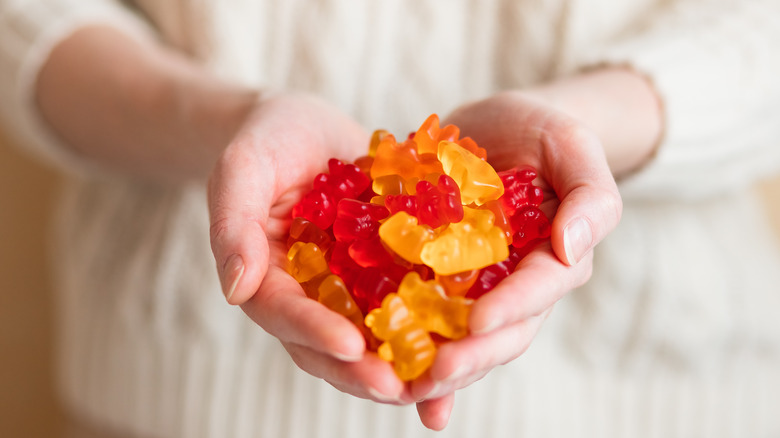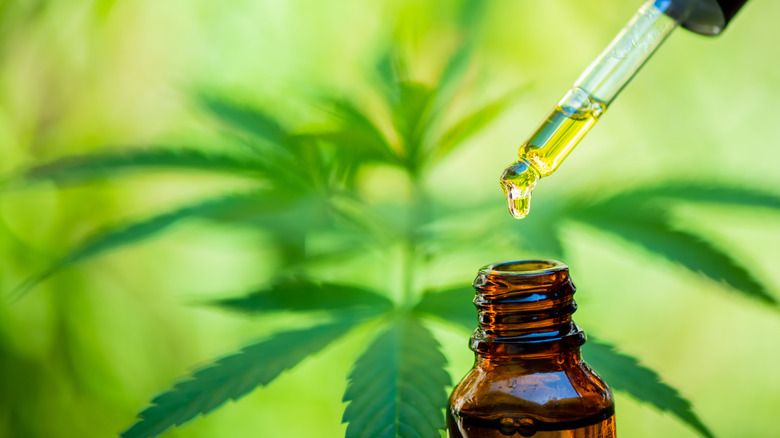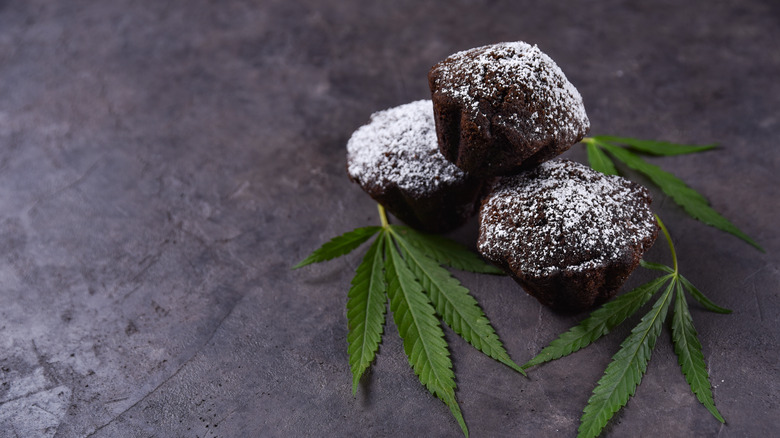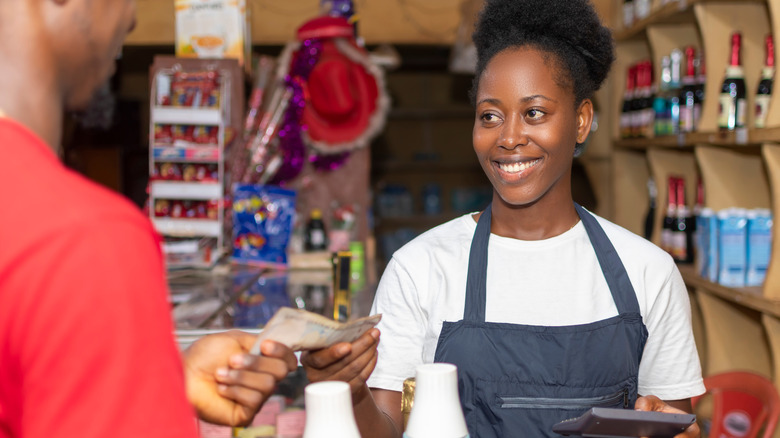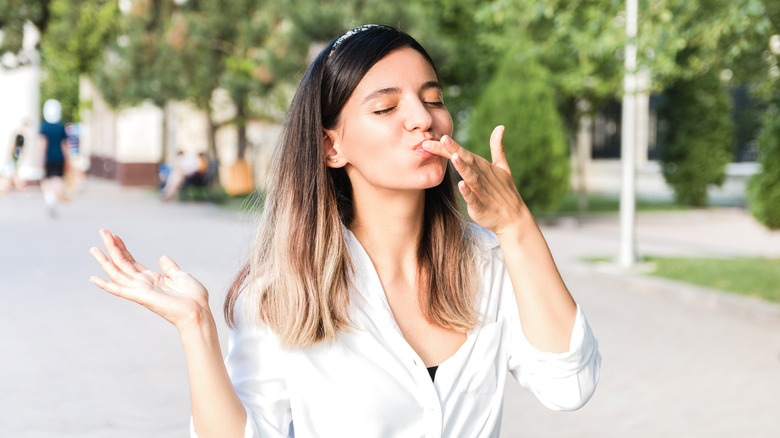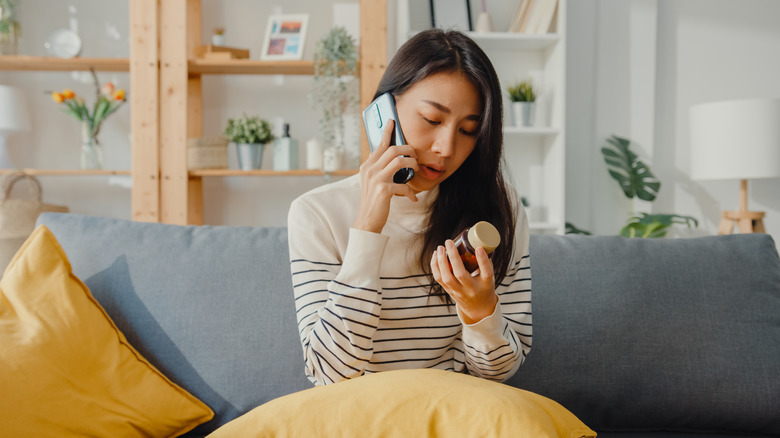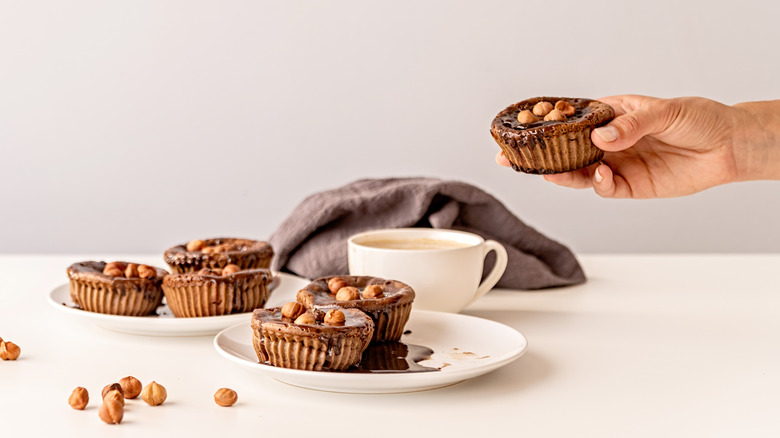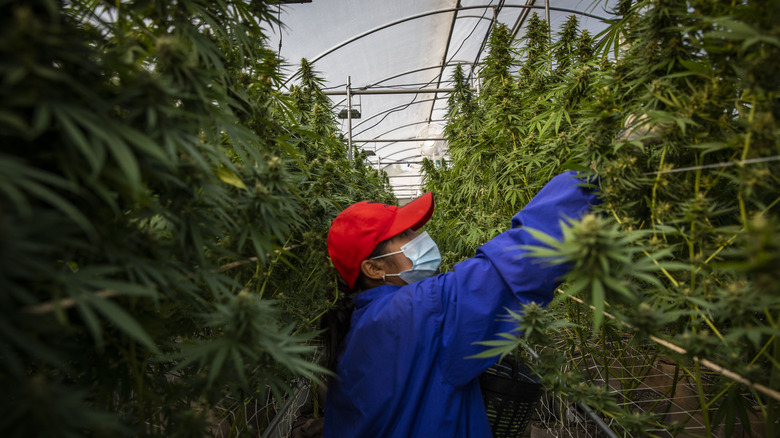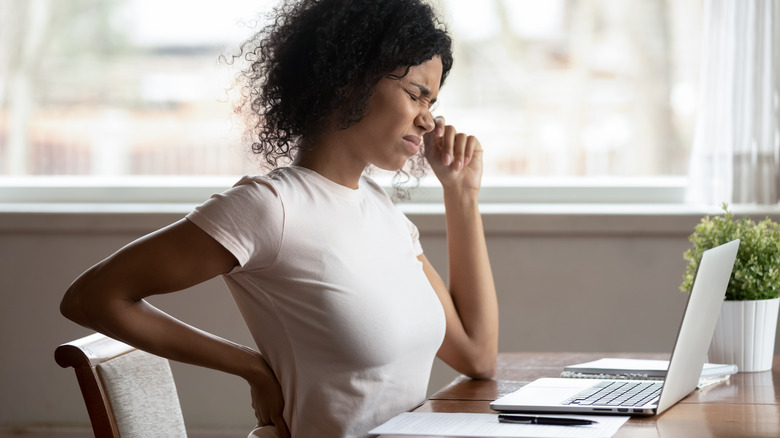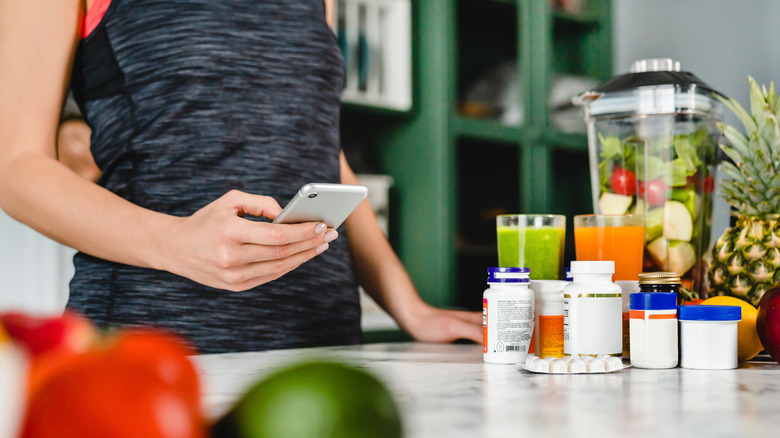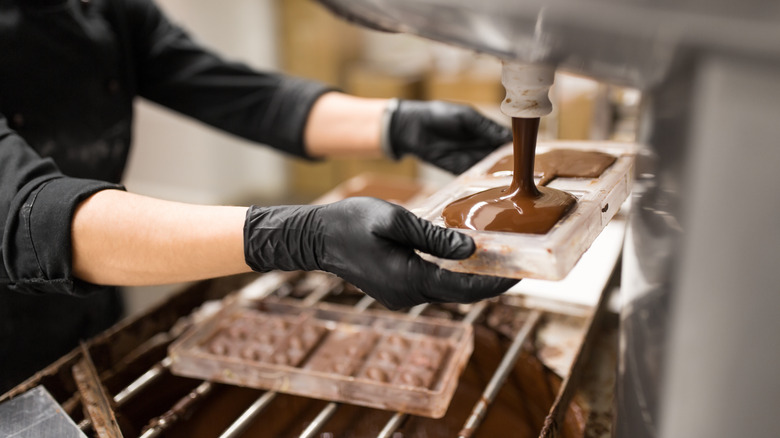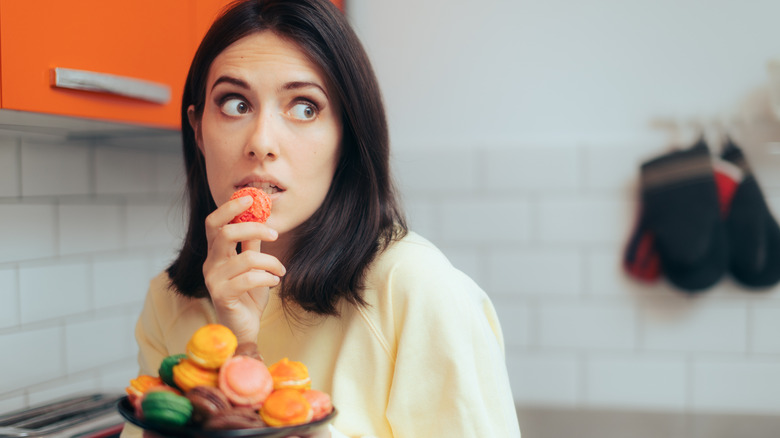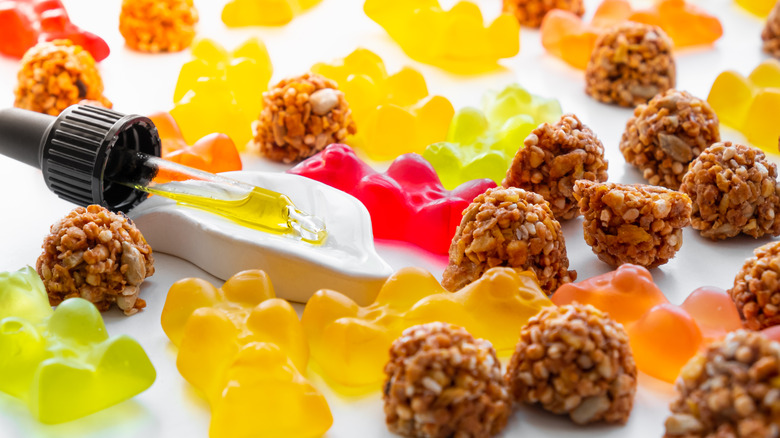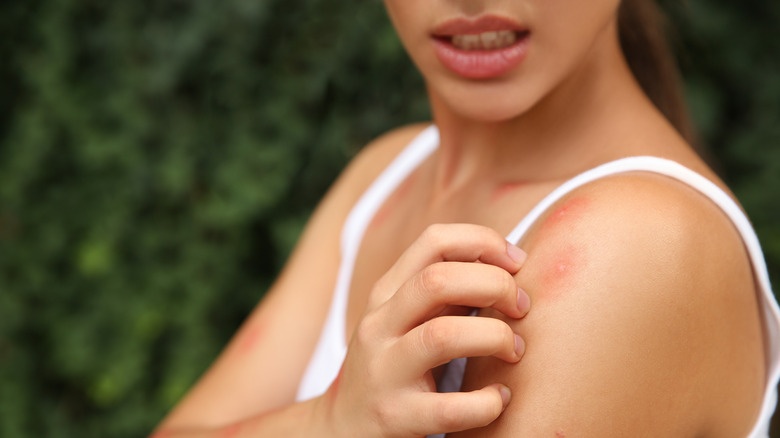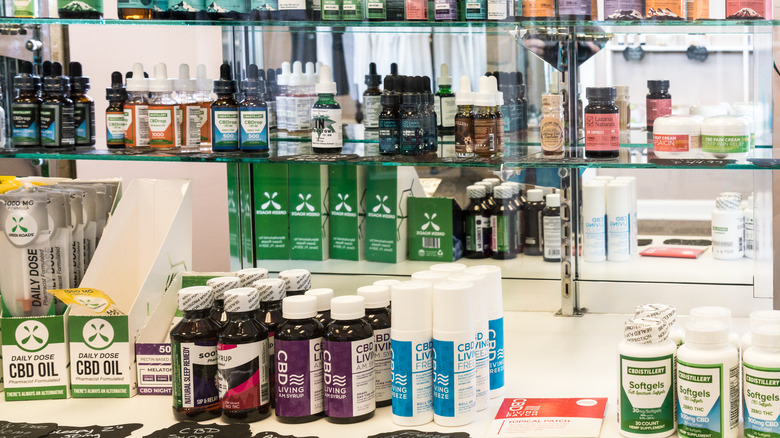Everything You've Been Wondering About CBD Edibles
One trend that has been making waves in the food industry is the rise of edible CBD products. Touting a long list of uses and benefits, CBD has garnered a lot of hype. Some have found that it is an effective natural remedy for certain conditions such as pain or anxiety, according to Verywell Health. Others enjoy using CBD as a sleep aid.
Despite its growing use, CBD remains somewhat controversial. This may be due to skepticism regarding its benefits, or worries about abuse. Some have concerns about its legality or safety. Much of this is still in flux as new products enter the market and the government continues to research CBD.
For those who haven't tried it yet, CBD will likely raise many questions. It's a good idea to educate yourself about CBD and what to expect prior to experimenting with new CBD products. With so many options available now, doing a little homework will help you get started. Whether you're trying to find out what CBD is, or just trying to decide which edible product to try first, you'll find answers here.
What is CBD?
What many people want to know about CBD is whether it is a drug, and in particular what its relationship to marijuana is. There is a lot of terminology to unpack when explaining CBD, so it's best to start with its history and origins.
Discovered in 1940 by chemist Roger Adams, CBD is a naturally occurring compound derived from the cannabis plant (via ACS). Although marijuana also comes from the cannabis plant, it isn't the same as CBD. The major difference is the amount of THC, the psychoactive compound, found in a particular cannabis plant. Legally, cannabis plants are considered hemp if they contain less than 0.3 percent THC, according to the FDA. Hemp plants can therefore produce legal CBD, while marijuana comes from cannabis plants with more than 0.3 percent THC. Health explains that CBD is short for the term "cannabidiol," and refers to the non-psychoactive portion of the hemp plant. The important thing to note here is that "CBD lacks psychotropic activity altogether," as stated in a British Journal of Pharmacology study.
In other words, despite coming from the same plant, CBD shouldn't be confused with marijuana.
Are CBD products legal?
The next big question most people want answered involves the legality of CBD products. Although somewhat complicated, ultimately, the answer rests on THC content. If CBD contains more than 0.3 percent THC, the federal government classifies it as marijuana and thus illegal (via PBS).
Another factor to consider is that the FDA has stated that "any product intended to have a therapeutic or medical use, and any product (other than a food) that is intended to affect the structure or function of the body of humans or animals, is a drug." So, you should be in the clear with a CBD food item, even if it lacks FDA approval, because at least it isn't going to be considered a drug. The FDA seems to be taking a permissive stance with CBD for now.
The short story is that CBD was deemed legal by the U.S. Farm Bill of 2018, which removed hemp from the list of controlled substances (via Brookings). This change also made CBD legal as a hemp product in all 50 states. However, the rules for acquiring and holding CBD products will vary state by state, as described by Health Canal. For example, in some states, only products approved by the FDA are legal.
How much does CBD cost?
Now that you know what CBD is, and that it is (generally) legal, you might be thinking it's time to start shopping. Before you do so, make sure you know what the market rates are. This is largely going to depend on the type of product you are buying (oils, gummies) and its level of strength or potency.
Prices can also be affected by how long a CBD company has been in business and what customers are saying. If they've managed to get their costs down by producing at scale, they may pass those savings on to you. Low prices aren't always good: If they've been getting bad reviews or are selling poor-quality products, this might show up in highly-discounted products. It's a good idea to look into the companies whose products you are considering to ensure that you are getting something that is of quality and fairly priced.
The price of CBD does vary, but according to Health, on average you should expect to pay $0.05 to $0.20 per mg of CBD oil. PRWeb shared an analysis of over 850 CBD oil prices and found that while consumer CBD products average about $0.10 per mg, prescription CBD cost around $0.14 per mg. If you're buying edibles like gummies, check the CBD content of each one to see if you're paying a fair price.
What does CBD taste like?
You might think that CBD ought to taste or smell like marijuana, and sometimes it does. However, different strains of cannabis have different flavors and aromas caused by terpenes, according to The Greenest. They can lead to specific and distinctive scents and tastes, such as earthy, peppery, or floral. These terpenes are other compounds found in cannabis, and these interact with the CBD in "full spectrum" products to influence your sensations and overall experience (via Healthline).
Flavonoids also affect the taste of your CBD. These naturally occurring chemicals appear in all kinds of plants, and serve to change a plant's aroma and flavor. They also contribute some possible health benefits, per Canna Insider.
So, what can the actual flavor be compared to? Well, one review from Cannaray CBD suggests that CBD oils with natural mint or citrus flavors added may be the most palatable. Otherwise, broad-spectrum CBD will taste like hemp (similar to marijuana), while unprocessed or crude CBD oil is more potent, and apparently doesn't taste very good at all. CBD isolate, on the other hand, has a neutral flavor but may lack some health benefits because it doesn't have terpenes or flavonoids. Of course, edible products can be flavored in numerous ways, and if they're made with CBD isolate, they may not have any hemp taste.
Is CBD safe to use?
Much of the science behind CBD is still in development, so it's difficult to say anything conclusively about the potential harms and benefits of CBD. That said, there are some promising studies available for review online which indicate mostly positive things about CBD. For one thing, an NIH study states that CBD may offer neuroprotective properties, and can be used effectively in high doses to treat serious conditions, such as diabetes and some psychiatric disorders. In lower doses, it demonstrates antioxidative and anti-inflammatory effects.
According to Bustle, there are some potential side effects, such as drowsiness or fatigue. It can also interact with some medications. In general though, CBD has few known side effects, and those that have been reported tend to be minor. As for whether you could actually harm yourself while using CBD, an Inverse article suggests that due to its potential sedative effect, CBD should probably not be consumed before driving. They do note that sleepiness results more often from high doses, but it's probably best to be on the safe side and stay at home with your edibles anyway.
Can I cook with CBD?
You might be surprised to learn that there are chefs who are devoted to cooking with cannabis and CBD. Celebrity chefs like Cat Cora and Nikki Steward are bringing these ingredients into the mainstream. You're not limited to gummies and pills with CBD. In addition, you can create baked goods, such as cakes and brownies. Smoothies and even cocktails work well with CBD oil too. It can also be used in hearty dishes, as demonstrated by Nikki Steward's signature cannabis mac and cheese (via YouTube). For this recipe, she uses a dropper to add the distilled liquid to her dish before baking.
Having CBD oil on hand makes the cooking process much simpler than having to handle actual hemp, and leaves room for you to get creative. You can integrate CBD into practically any dish, and experiment until you find what works. Of course, keep in mind that CBD can have a strong flavor, so the amount you choose to incorporate may have a real impact on the taste of your creation. But if it's a flavor you enjoy, then all the better. You'll also want to keep an eye on the amount used to ensure you are measuring out the dosage you desire. Finally, be sure not to leave CBD oil over high heat, as Epicurious reports it will ruin the flavor.
Where does CBD originate from?
You might be curious to know who grows the hemp plants that produce our CBD products, and where the farms are located. The USDA regulates our trade of hemp and requires a permit for the import of hemp plants from countries other than Canada. U.S. Census data states that our hemp imports grew from about $3 million in 2009 to more than $66 million in 2019. Notably, 89% of those hemp imports for 2019 came from Canada.
Domestic supply in the U.S. is growing along with demand. The USDA offers farm programs to boost our industrial hemp output. Undoubtedly, the government recognizes the shift in demand and is looking to meet it with supply that we can produce ourselves.
Finally, if you like to be sure you're getting the best, there are tips available for buying CBD with care. Well + Good suggests that because the market is still largely unregulated, it's ideal to find organically grown CBD so you can avoid contaminants and pesticides. You could also check the label to see if it will tell you where it was produced, but it seems like most of our CBD is domestic and Canadian.
Does it have medicinal uses?
By now, many studies have looked into the benefits CBD is purported to offer. It's worth questioning whether CBD is really helping people, and what it can potentially do for you. In particular, it seems CBD may be able to replace some existing medications and provide an alternative treatment for pain and other ailments. One way it is said to provide relief is with travel anxiety. Salon reports that some travelers have found CBD is useful in calming their fear of flying, with people stating they were able to replace alcohol or Xanax with CBD edibles.
Open Access Government lists a wide range of potential benefits from CBD use. These include use as a sleep aid, as a treatment for migraines and muscle pain, nausea, and weight loss, among others. There is even an FDA-approved drug called Epidiolex, which is an oral CBD solution used to treat two severe forms of epilepsy. It has proven effective in reducing the frequency of seizures in patients, further demonstrating the scope of medicinal power it offers. It's worth noting that the FDA has not approved CBD for treating any other medical condition, so more research is needed to prove whether or not CBD actually helps with the many other ailments it's reputed to treat.
How much CBD should I take?
Before consuming edible CBD products, you'll want to know the right amount to take. While recognizing this will largely be determined by your personal experience, and therefore some experimentation is required, it is best to start slow. Keep in mind that units aren't necessarily standardized across different products, so each time you try a new edible, you'll want to test the waters with a small dose.
Forbes Health suggests that CBD oil is ideal for controlling the quantity you'll ingest, as gummies and other CBD snacks tend to offer little dosage flexibility. Of course, you could eat half a gummy to see how this affects you, but using a dropper to add CBD to food will give you a more visual understanding of the actual amount. Forbes Health also offers particular dosages to correspond to ailments you may want to treat. For example, for anxiety 300 to 600 mg per day may be ideal.
Bodyweight does seem to play a role in determining the proper range for each person, and the severity of a condition may also require a corresponding dose. MyDosage offers a calculator which will help you figure out what amount of CBD is ideal for your personal situation.
How popular is CBD?
The market for CBD edibles is growing quickly, and at this point most of us have already heard of these products. According to a 2019 Gallup poll, about 14% of Americans have used CBD products, and only 1/3 of Americans are unfamiliar with them. Growing access to and awareness about CBD has led many to give it a try.
As Scientific American points out, the market for CBD is expected to hit $20 billion by 2024, with multiple countries having already approved CBD-related drugs and therapies. In the UK, 6 million adults have consumed CBD in the last year, and more than 70% of these consumers are purchasing CBD oils and tinctures (via Open Access Government). This trend is worldwide and doesn't seem to be going away any time soon. If you're worried that it's still too early to try CBD, you should know that plenty of people have already done so successfully.
Is CBD addictive?
One of the main concerns some detractors have regarding CBD is that it may lead to addiction. On the contrary, evidence has actually shown that CBD may be useful in treating addictions such as opioid dependency, according to an NIH study. With regard to opioid overdoses, the researchers state, "these findings on cannabis substitution effect and the biological mechanisms behind it strongly suggest that cannabis could play a role in reducing the public health impacts of prescription and non-prescription opioids."
A Nature article also explores the role CBD can play in replacing harmful addictive substances and likewise concludes that CBD products may be an effective remedy. You might still wonder if one addiction is being replaced by another when CBD is substituted. However, the World Health Organization states, "In humans, CBD exhibits no effects indicative of any abuse or dependence potential," and "there is no evidence of recreational use of CBD or any public health related problems associated with the use of pure CBD." So, it seems you can rest easy on this front.
What kinds of edible CBD products are there?
You'll be amazed to find the number of edible products containing CBD these days. Most of us have already seen or heard of CBD gummy bears, capsules, and oil. Additionally, there are other CBD candies like gumdrops and chocolates offered by a number of producers. For those seeking kitchen ingredients, there is even CBD-infused olive oil or honey. Other products mentioned by Forbes include CBD taffy chews and chocolate-covered goji berries with CBD. The options are seemingly endless. This is one versatile product.
There are beverages with CBD available as well. Sparkling waters, teas, and cold brews with CBD have been created to offer sippable, on-the-go options (via Food & Beverage Insider). The Healthy points out that edible CBD tends to last longer than inhaled options, but that you should be careful when selecting which to buy. "Only one in four CBD edibles contains the labeled amount of CBD," they said. Again, this is likely due to the lack of regulation within a new marketplace. So, be sure to do some research and read reviews before spending your money on your new CBD snacks.
Is it possible to have a CBD allergy?
The short answer is that, yes, you can be allergic to CBD. According to US News & World Report, those with an allergy to marijuana may also have an allergic reaction triggered by CBD oil use. This is due to potential allergen contamination from the plant. If you have a cannabis allergy, this may manifest in itchiness from touching the plant or sneezing and asthma from inhalation. As for hemp edibles, ingestion may cause anaphylaxis or other serious reactions, according to AAAAI.
Though there is no standardized measure or way of testing one's sensitivity to cannabis, an allergist may be able to provide a skin prick test.
For those who aren't allergic to cannabis, CBD products could actually help with other allergies. Health Canal says that since CBD can help to reduce inflammation, it can serve also as a preventative antihistamine. As mentioned above, it's best to start your CBD use with a small dose to gauge your personal reaction and recognize if there is physical sensitivity.
Where can I buy CBD?
There are all kinds of edible CBD available right now, and even better is that these products are accessible in many local shops, grocery stores, and pharmacies. Vitamin Shoppe has a dedicated page on its website for CBD, with liquids, gummies, and softgels available. Other drug stores, like Walgreens and CVS, have begun to sell CBD products (via Men's Health). Homemaking maven Martha Stewart has even launched her own line of CBD wellness products.
Some well-known brands include Five Hemp, which sells full spectrum products, and Medterra CBD, which has a range of items, including CBD for pets. The NY Post offers a buying guide listing some of the best CBD companies and coupon codes to help you get started.
Finding CBD is much easier these days than it would have been just a couple of years ago. With new edible CBD products hitting the market all the time, now is a great time to find out what works best for you.
